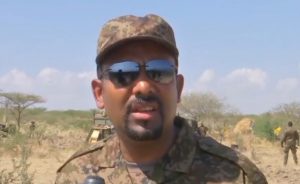Sudan’s Darfur conflict: Why Abdullah has never seen his ‘home’

Fourteen-year-old Abdullah sits on an old tyre outside a ramshackle hut in a sprawling, impoverished camp for displaced people.
He was born in Abu Shouk camp, just outside Fasher in North Darfur, where he has spent his entire life – he has never seen the village his family calls home.
“I’ve been told that my family and other relatives were living together in a very beautiful village surrounded by green land.
“My parents have told me that it was a lovely place and that life was so much better there.”
Abdullah, who has only seen a television once in his life, lives in fear of armed gangs who often raid the camp at night.
“We have to hide, there’s nothing more we can do. If you confront them you’ll be attacked.”
It is hoped that a recent peace deal will enable Abdullah and his family to go home, and finally put an end to the 17-year-long conflict in Darfur, which has left 300,000 people dead and forced 2.5 million people to flee their homes.
The violence began back in 2003 when armed groups there rebelled against the government, claiming their region was neglected.
Khartoum responded by arming Arab nomad herders, who became known as the notorious Janjaweed, and paying them to brutally supress the uprising.
Most rebel groups have now signed a peace agreement with the government, but at least 1.5 million people, like Abdullah, remain in around 60 camps spread across Darfur.
‘Every day is killing’
A trip to the jittery town of Nertiti, about six hours drive from Abu Shouk camp, highlights another reason why many displaced people are still refusing to go home.
Most farmers there are too afraid to go into their fields following numerous killings and rapes.
Those in the town itself clearly are not safe either.
Armed groups, described as Janjaweed, recently shot dead Khadiga Ishag’s husband and one of her sons before shooting her too at their home in Nertiti.
“Every day is crisis, every day is killing,” she said.
“We don’t trust our government, the military or the police, we really don’t trust them at all. If a solution isn’t found there will be genocide here.”
The reason Khadiga and others are frightened of the army is that its ranks have long contained many former Janjaweed fighters, the very people who terrorised them for so long.
Not only that but under the new peace deal members of other armed groups are to be amalgamated into the Sudanese military.
There is another reason too.
At the end of December the international peacekeeping force Unamid, once the biggest in he world, is finally pulling out of Sudan after 13 years.
Despite the widely held belief that this combined United Nations-African Union force has not always been effective in protecting civilians here, its presence is thought to have helped curb abuses by the security forces.



